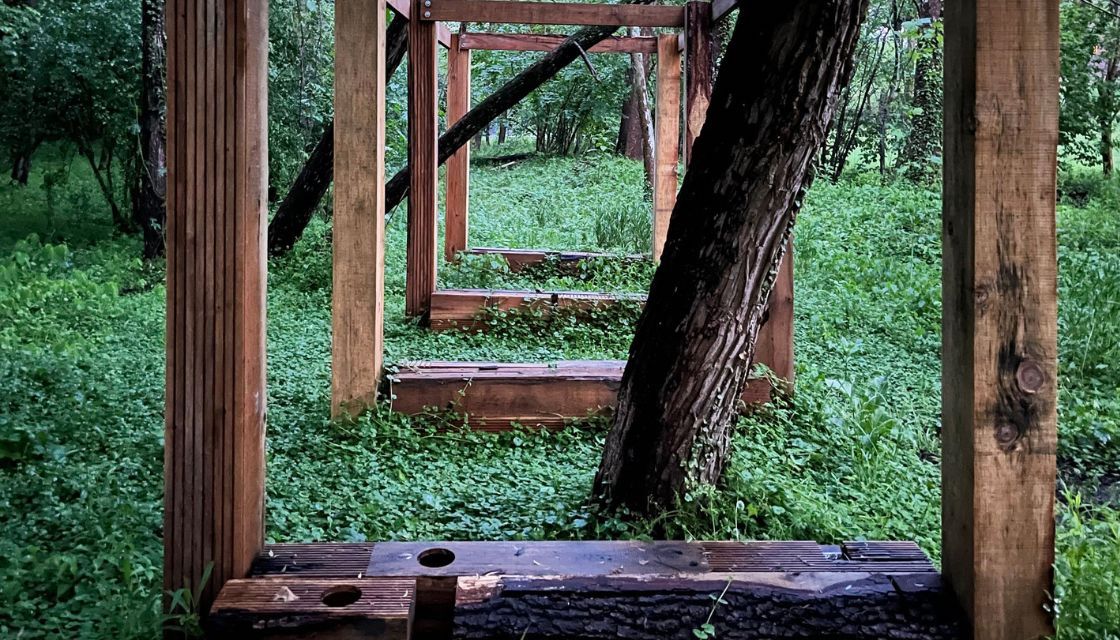CED awards four faculty seed grants for climate research
CED announces grants to support climate research projects that investigate carbon-neutral timber construction, new methods of wildfire risk mitigation, converting commercial buildings into affordable housing, and the environmental impacts of AI.

The College of Environmental Design has awarded Lau Grants for Just Climate Futures to teams led by Liz Gálvez (Department of Architecture) and Paul Mayencourt (Department of Architecture and the College of Engineering’s Department of Environmental Science, Policy, and Management), Marta Gonzalez and Maryam Hosseini (Department of City & Regional Planning), and Ramon Weber (Department of Architecture), and an Arcus Foundation grant to Danika Cooper and Victoria Mohr (Department of Landscape Architecture & Environmental Planning).
Now in its third year, Lau Grants for Just Climate Futures support projects led by CED faculty that aim to reduce the impacts of climate change and emphasize equitable, actionable solutions. The Arcus Foundation endowment to the college supports projects that advance the understanding of how the environment impacts social inequities.
Investigators will work with CED students in the summer and fall to develop scalable, place-based solutions to the climate crisis. The results of their research will be disseminated in spring 2026 in multiple formats: an exhibition, a demonstration pavilion, a symposium, and journal articles.
A truly circular ecology for timber architecture: from the forest to built form, and back
Liz Gálvez, Assistant Professor of Architecture
Paul Mayencourt, Assistant Professor of Cooperative Extension, Department of Environmental Science, Policy, and Management and the Department of Architecture
The project led by Gálvez and Mayencourt focuses on designing and building a wooden structure that tests biodegradability and material circularity. It will evaluate nutrient release, carbon impact, and decomposition over time, contributing to broader discussions on sustainable building systems and regenerative life-cycle design.
While existing research on circularity has predominantly focused on the reuse of components or materials within the building and rebuilding cycles, Gálvez and Mayencourt will investigate what happens to the materials after their use in buildings, considering the full material ecology of timber construction: from the forest to built form, and back.
The project will result in a demonstration pavilion constructed at the Russell Research Forest, which will educate about material ecologies to model new approaches for design and practice./
Multiscale mitigation of wildfire risk vulnerabilities in the natural and built environments
Marta C. Gonzalez, Associate Professor of City & Regional Planning
Maryam Hosseini, Assistant Professor of City & Regional Planning
In the wake of the recent L.A. fires, this project brings a proactive perspective to regional fire suppression and neighborhood-scale mitigation. Gonzalez and Hosseini will work in collaboration with Professor Emeritus John Radke and Minho Kim, a doctoral student in landscape architecture and environmental planning, as well as with the Berkeley FireSafe Council.
At the regional scale, the team will further develop and test software that has been used in Spain and elsewhere to segment terrain and generate networks to inform fire suppression tactics in California. This tool helps planners and incident commanders strategize firefighting tactics that better anticipate wildfire’s potential behavior. At the neighborhood scale, they will use computer vision to detect hazards around Berkeley homes and estimate shared risk among neighbors.
The project goal is to integrate this new software into an interactive decision support system for emergency response agencies and an open-source platform for planners and homeowners, empowering them to make smarter risk-informed decisions to mitigate the risk of catastrophic wildfires.
Unlocking urban potential — Computational methods for adaptive reuseand building retrofits in downtown Oakland and San Francisco
Ramon Weber, Assistant Professor of Architecture
In the context of California’s ongoing housing crisis and abundance of unused office space, this project will apply computational methods to assess existing commercial buildings for conversion to affordable residential use in Oakland and San Francisco.
By combining architectural design with environmental simulations, Weber aims to quantify the environmental impact of different retrofit strategies.While existing case studies for office building retrofits focus predominantly on luxury housing, Weber’s project explores architectural strategies and programming for purpose-built affordable housing.
In collaboration with the Terner Center for Housing Innovation, housing justice organizations, and planning departments, Weber plans to develop architectural case studies on prototypical buildings and, through computational urban models, show how they could impact the city’s housing stock when implemented at scale.
The typological studies, simulations, and analysis will be disseminated through an exhibition and research publication.
The hydrological atlas of AI: Water as resistance in the age of digital infrastructure
Danika Cooper, Associate Professor of Landscape Architecture & Environmental Planning
Victoria Mohr, Lecturer in Landscape Architecture & Environmental Planning
Cooper and Mohr will reframe the seemingly immaterial technology as a place-based process that depends on physical infrastructures and quantifiable non-renewable resources. They focus their research in Chile, where a growing number of AI data centers, as well as factories that produce the lithium batteries needed to maintain AI systems, consume vast quantities of water.
The team will investigate generative AI’s reliance on water to question when (and if) its potential benefits for environmental design will surpass its social and environmental impacts. (AI data centers require many millions of liters of water to cool servers — a 2025 study found that a single 100-word email generated by ChatGPT consumed about 16 ounces, or the volume of a water bottle). They will consider the impact of AI systems on local water resources for those who depend on them — likely those who benefit the least from AI — as well as the scale and intensity of landscape transformation.
Research outcomes will be disseminated in an atlas of maps and sectional diagrams, a journal article, and a symposium.
View past Lau Grant for Just Climate Futures projects: